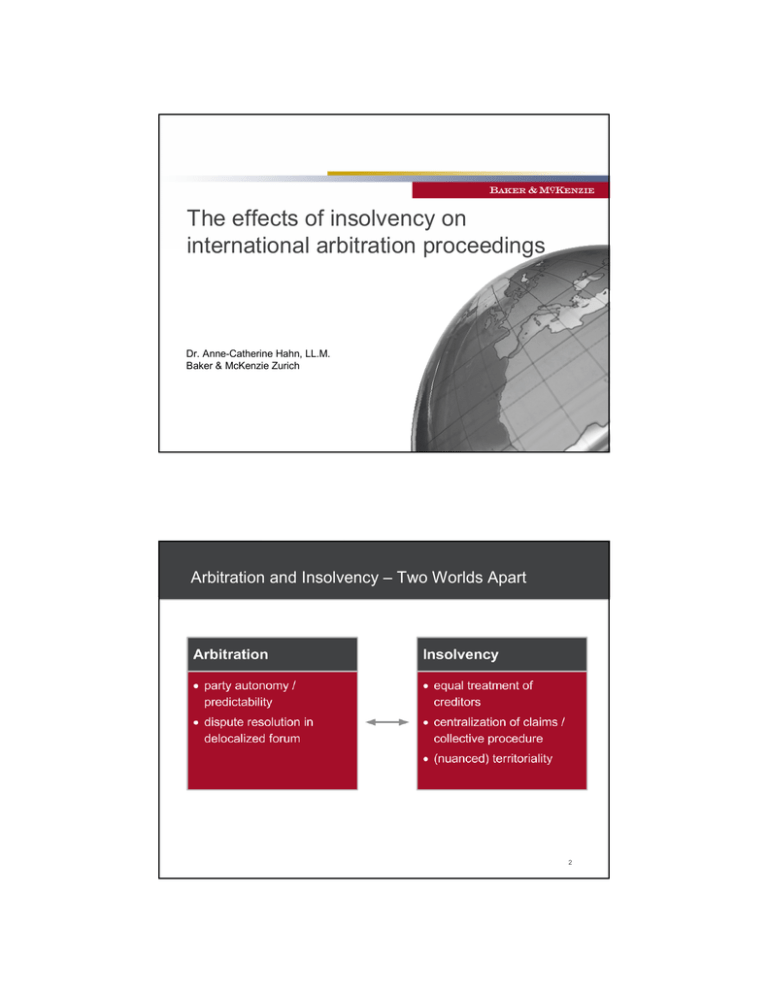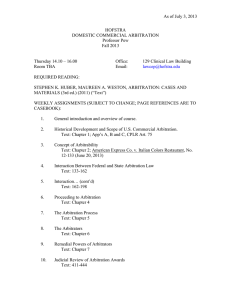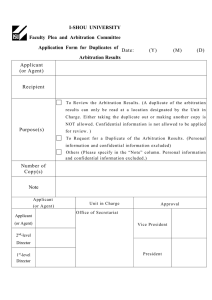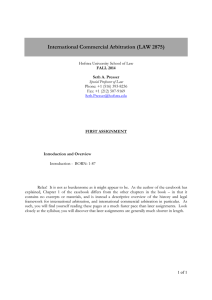The effects of insolvency on international arbitration proceedings
advertisement

The effects of insolvency on international arbitration proceedings Dr. Anne-Catherine Hahn, LL.M. Baker & McKenzie Zurich ©2011 Baker & McKenzie Zurich Arbitration and Insolvency – Two Worlds Apart 2 The Vivendi / Elektrim Case » Vivendi and others vs. Elektrim SA (Poland) and others: dispute regarding ownership rights in Polish telecom company » 2003/2006 initiation of arbitration proceedings in England (LCIA Rules) and Switzerland (ICC Rules) » August 2007: Elektrim SA is declared bankrupt in Warsaw pursuant to its own petition » Elektrim SA requests termination of arbitration proceedings based on Article 142 of the Polish Bankruptcy and Restructuring Law 3 Article 142 of the Polish Bankruptcy and Restructuring Law… 4 …and How It Was Applied in the Vivendi Case 5 » What rules govern conflicts between arbitration in one country and insolvency proceedings in another country? » Can or should arbitration proceedings continue despite one party having become insolvent? 6 Arbitrating Against Insolvent Parties in Domestic Settings » German and French law • arbitration may continue with modified request for relief, after the claim has been filed with the insolvency administrator or court • rights and remedies directly related to the insolvency (e.g. clawback actions) are not arbitrable • no decision on rank / no payment outside insolvency proceedings » English law: need to obtain leave from courts to start or continue any proceedings 7 Arbitrating Against Insolvent Parties in Switzerland » no automatic invalidity of arbitration clauses, but » mandatory rules on jurisdiction for claims concerning the composition of the estate • actions targeted at payment out of the estate • actions targeted at the return of assets • clawback / avoidance actions » no automatic recognition of claims pending in arbitration by administrator need to re-litigate 8 Possible Coordination in International Cases (I) » Which mandatory rules for international arbitration? » Law of the seat of arbitration? • define mandatory standards through possibility of an appeal • but no direct guidelines for coordination with foreign insolvency proceedings − conflict rules re capacity, arbitrability, arbitration agreement (Swiss solution in Vivendi)? − domestic insolvency rules by analogy (English solution in Vivendi)? 9 Possible Coordination in International Cases (II) » Direct application of the lex concursus? • Art. 142 PBR (discontinuation of proceedings) or Art. 487 Latvian CCP (loss of arbitrability) as exceptions • to be considered generally or only if they qualify as public policy rules? • stay of pending proceedings as (mandatory) concession to foreign insolvency 10 Conclusion » no problems if an award can be obtained before the opening of insolvency » otherwise: disruptive effect; no clear guidelines for coordination » stay of arbitration proceedings as rule » continuation of arbitration, if enforcement (i) is possible under insolvency regime, or (ii) can be directed against third parties » ultimately enforcement options are decisive 11 Holbeinstrasse 30 CH - 8034 Zurich +41 (44) 384 14 14 www.bakermckenzie.com anne-catherine.hahn@bakermckenzie.com [change title in View/Header and Footer] 12



